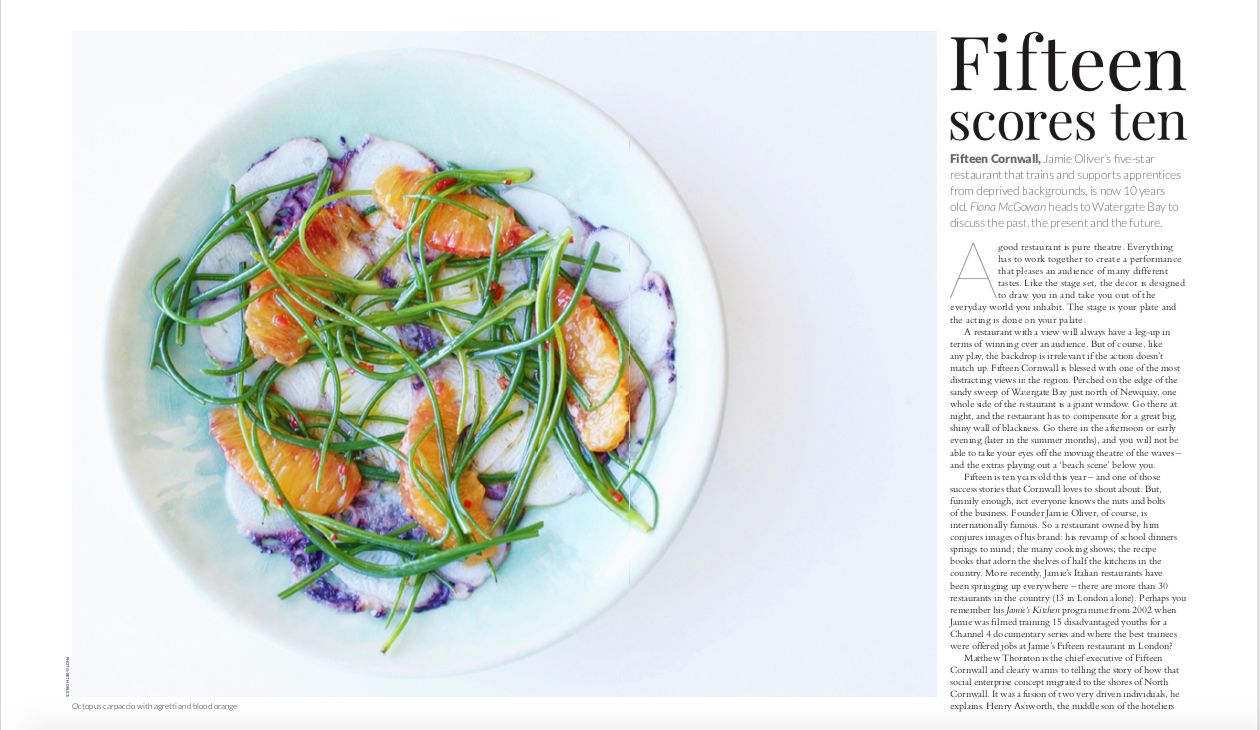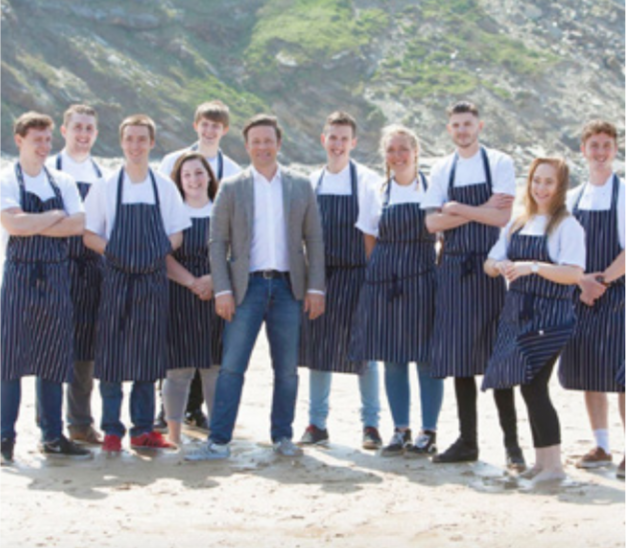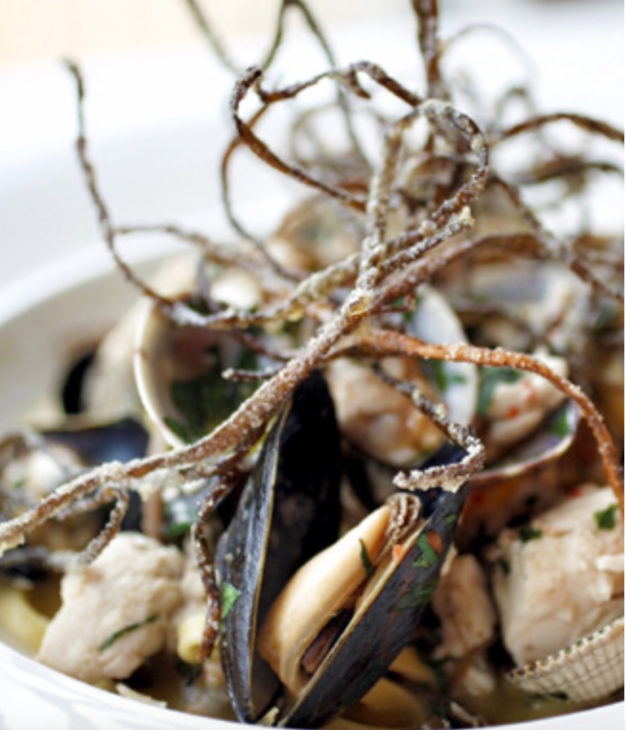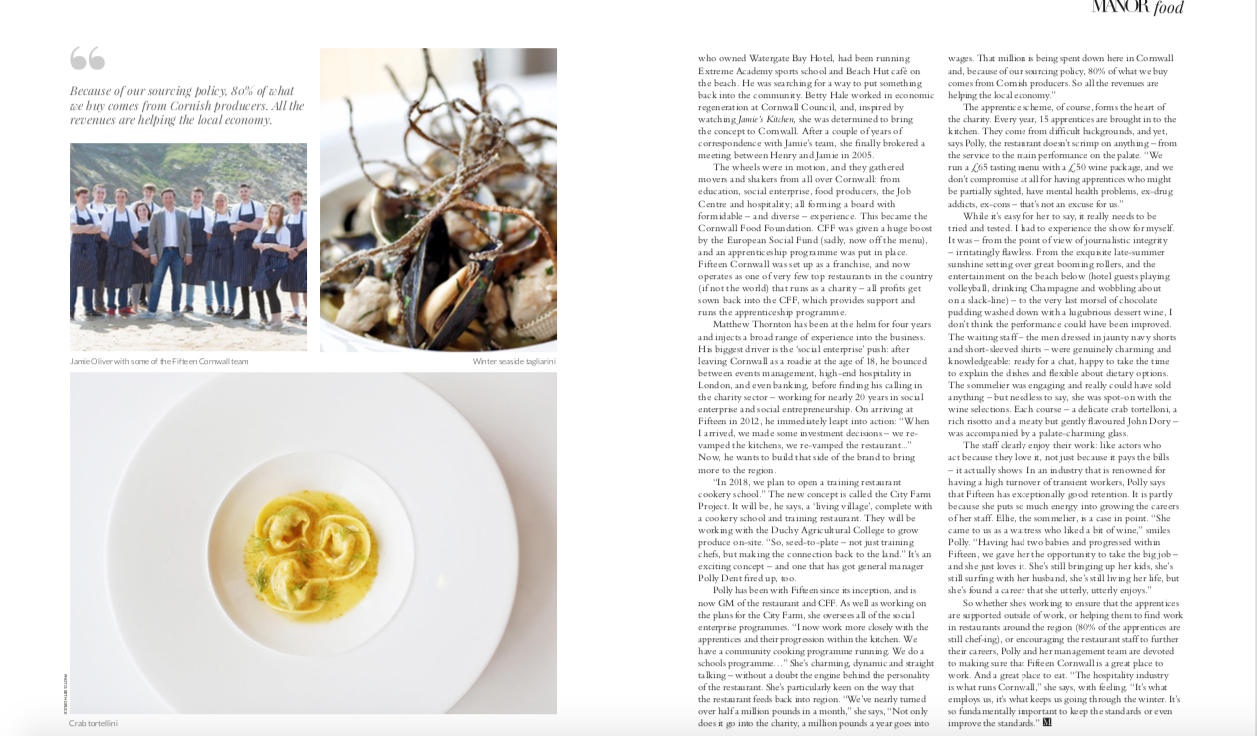Fifteen scores ten

A good restaurant is pure theatre. Everything has to work together to create a performance that pleases an audience of many different tastes. Like the stage set, the decor is designed to draw you in and take you out of the everyday world you inhabit. The stage is your plate and the acting is done on your palate.
A restaurant with a view will always have a leg-up in terms of winning over an audience. But of course, like any play, the backdrop is irrelevant if the action doesn’t match up. Fifteen Cornwall is blessed with one of the most distracting views in the region. Perched on the edge of the sandy sweep of Watergate Bay just north of Newquay, one whole side of the restaurant is a giant window. Go there at night, and the restaurant has to compensate for a great big, shiny wall of blackness. Go there in the afternoon or early evening (later in the summer months), and you will not be able to take your eyes off the moving theatre of the waves – and the extras playing out a ‘beach scene’ below you.
Fifteen is ten years old this year – and one of those success stories that Cornwall loves to shout about. But, funnily enough, not everyone knows the nuts and bolts of the business. Founder Jamie Oliver, of course, is internationally famous. So a restaurant owned by him conjures images of his brand: his revamp of school dinners springs to mind; the many cooking shows; the recipe books that adorn the shelves of half the kitchens in the country. More recently, Jamie’s Italian restaurants have been springing up everywhere – there are more than 30 restaurants in the country (13 in London alone). Perhaps you remember his Jamie’s Kitchen programme from 2002 when Jamie was filmed training 15 disadvantaged youths for a Channel 4 documentary series and where the best trainees were offered jobs at Jamie’s Fifteen restaurant in London?

Matthew Thornton is the chief executive of Fifteen Cornwall and clearly warms to telling the story of how that social enterprise concept migrated to the shores of North Cornwall. It was a fusion of two very driven individuals, he explains. Henry Ashworth, the middle son of the hoteliers who owned Watergate Bay Hotel, had been running Extreme Academy sports school and Beach Hut café on the beach. He was searching for a way to put something back into the community. Betty Hale worked in economic regeneration at Cornwall Council, and, inspired by watching Jamie’s Kitchen, she was determined to bring the concept to Cornwall. After a couple of years of correspondence with Jamie’s team, she finally brokered a meeting between Henry and Jamie in 2005.
The wheels were in motion, and they gathered movers and shakers from all over Cornwall: from education, social enterprise, food producers, the Job Centre and hospitality; all forming a board with formidable – and diverse – experience. This became the Cornwall Food Foundation. CFF was given a huge boost by the European Social Fund (sadly, now off the menu), and an apprenticeship programme was put in place. Fifteen Cornwall was set up as a franchise, and now operates as one of very few top restaurants in the country (if not the world) that runs as a charity – all profits get sown back into the CFF, which provides support and runs the apprenticeship programme.
Matthew Thornton has been at the helm for four years and injects a broad range of experience into the business. His biggest driver is the ‘social enterprise’ push: after leaving Cornwall as a roadie at the age of 18, he bounced between events management, high-end hospitality in London, and even banking, before finding his calling in the charity sector – working for nearly 20 years in social enterprise and social entrepreneurship. On arriving at Fifteen in 2012, he immediately leapt into action: “When I arrived, we made some investment decisions – we re- vamped the kitchens, we re-vamped the restaurant...” Now, he wants to build that side of the brand to bring more to the region.
“In 2018, we plan to open a training restaurant cookery school.” The new concept is called the City Farm Project. It will be, he says, a ‘living village’, complete with a cookery school and training restaurant. They will be working with the Duchy Agricultural College to grow produce on-site. “So, seed-to-plate – not just training chefs, but making the connection back to the land.” It’s an exciting concept – and one that has got general manager Polly Dent fired up, too.

Polly has been with Fifteen since its inception, and is now GM of the restaurant and CFF. As well as working on the plans for the City Farm, she oversees all of the social enterprise programmes. “I now work more closely with the apprentices and their progression within the kitchen. We have a community cooking programme running. We do a schools programme...” She’s charming, dynamic and straight talking – without a doubt the engine behind the personality of the restaurant. She’s particularly keen on the way that the restaurant feeds back into region. “We’ve nearly turned over half a million pounds in a month,” she says, “Not only does it go into the charity, a million pounds a year goes into wages. That million is being spent down here in Cornwall and, because of our sourcing policy, 80% of what we buy comes from Cornish producers. So all the revenues are helping the local economy.”
The apprentice scheme, of course, forms the heart of the charity. Every year, 15 apprentices are brought in to the kitchen. They come from difficult backgrounds, and yet, says Polly, the restaurant doesn’t scrimp on anything – from the service to the main performance on the palate. “We run a £65 tasting menu with a £50 wine package, and we don’t compromise at all for having apprentices who might be partially sighted, have mental health problems, ex-drug addicts, ex-cons – that’s not an excuse for us.”
While it’s easy for her to say, it really needs to be tried and tested. I had to experience the show for myself. It was – from the point of view of journalistic integrity – irritatingly flawless. From the exquisite late-summer sunshine setting over great booming rollers, and the entertainment on the beach below (hotel guests playing volleyball, drinking Champagne and wobbling about on a slack-line) – to the very last morsel of chocolate pudding washed down with a lugubrious dessert wine, I don’t think the performance could have been improved. The waiting staff – the men dressed in jaunty navy shorts and short-sleeved shirts – were genuinely charming and knowledgeable: ready for a chat, happy to take the time to explain the dishes and flexible about dietary options. The sommelier was engaging and really could have sold anything – but needless to say, she was spot-on with the wine selections. Each course – a delicate crab tortelloni, a rich risotto and a meaty but gently flavoured John Dory – was accompanied by a palate-charming glass.

The staff clearly enjoy their work: like actors who act because they love it, not just because it pays the bills – it actually shows. In an industry that is renowned for having a high turnover of transient workers, Polly says that Fifteen has exceptionally good retention. It is partly because she puts so much energy into growing the careers of her staff. Ellie, the sommelier, is a case in point. “She came to us as a waitress who liked a bit of wine,” smiles Polly. “Having had two babies and progressed within Fifteen, we gave her the opportunity to take the big job – and she just loves it. She’s still bringing up her kids, she’s still surfing with her husband, she’s still living her life, but she’s found a career that she utterly, utterly enjoys.”
So whether she’s working to ensure that the apprentices are supported outside of work, or helping them to find work in restaurants around the region (80% of the apprentices are still chef-ing), or encouraging the restaurant staff to further their careers, Polly and her management team are devoted to making sure that Fifteen Cornwall is a great place to work. And a great place to eat. “The hospitality industry
is what runs Cornwall,” she says, with feeling. “It’s what employs us, it’s what keeps us going through the winter. It’s so fundamentally important to keep the standards or even improve the standards.”

